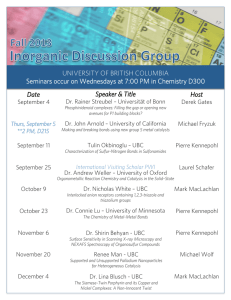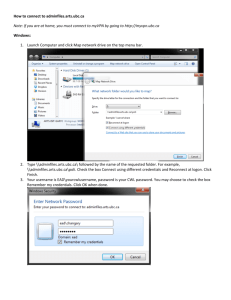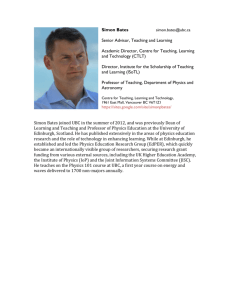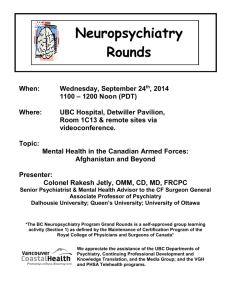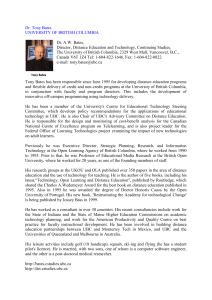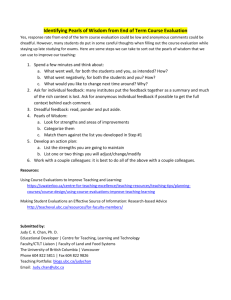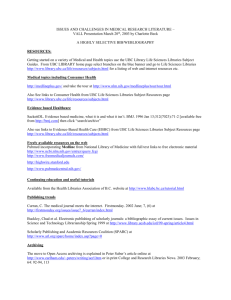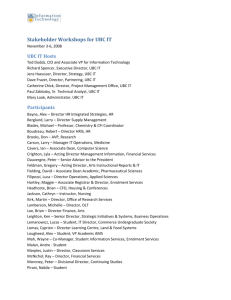Career Development Plan
advertisement
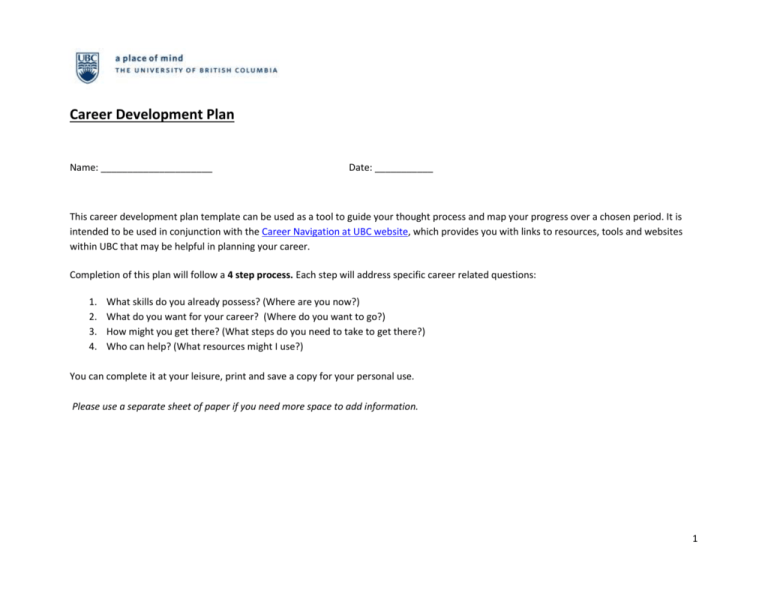
Career Development Plan Name: _____________________ Date: ___________ This career development plan template can be used as a tool to guide your thought process and map your progress over a chosen period. It is intended to be used in conjunction with the Career Navigation at UBC website, which provides you with links to resources, tools and websites within UBC that may be helpful in planning your career. Completion of this plan will follow a 4 step process. Each step will address specific career related questions: 1. 2. 3. 4. What skills do you already possess? (Where are you now?) What do you want for your career? (Where do you want to go?) How might you get there? (What steps do you need to take to get there?) Who can help? (What resources might I use?) You can complete it at your leisure, print and save a copy for your personal use. Please use a separate sheet of paper if you need more space to add information. 1 1. Where are you now? This process starts with taking a good look at where you are currently at. What are your skills, talents and interests? What are your values – do you like to lead, work with people or alone with data or text? Do you like working face to face with people or prefer independent work? Do you like to work inside or outside? Do you like working to deadlines? Which teams do you like working on, quiet or loud, small or large? Answering the questions below will assist you in determining your starting point. There are several tools & resources that can assist you with this. Please refer to the navigating your career at UBC website Question Where am I now in regards to my career? Notes. What is my view of current situation? What have been my experiences to date? What do I enjoy most? What skills come to me naturally? What do I think my strengths/assets are? (Skills, knowledge, talents, interests)? What are some things people ask me to help with? 2 What do I do well? What appeals to me? What are my values? (work/life) Do I like to lead, work with people as a team or work alone (with data or text)? Do I like working face to face with customers or back office work? How do I feel when I think about my ideal job (excited, motivated, fear)? Is there anything getting in my way of achieving what I want? 3 2. Where do you want to go? What you'll do next is: Consider your career goals Explore your career options. Develop concise written statements related to your goals and add them to the table below. Knowing where you want to go makes the next steps in determining your future career move much easier. There are several tools & resources that can assist you with this. Please refer to the navigating your career at UBC website Question What does my ideal job look like? Notes If I could do any job in the world what might it be and why? What are my goals (short/long term)? What energizes me? Where do I want to be (in 1 yr, in 5 yrs) Are there any specific challenges I want to face? 4 Question Notes Why is this important to me? What do I want to see/get/do more of? What do I want to see/get/do less of? What is my preferred balance between work and my personal life? Who else does this affect? What normally gets in the way of achieving my goals? What kind of work environment suits me best? Do I feel I have a calling in life? 5 3. How might I get there? By answering questions 1 & 2, you should now have a clearer idea of what you want & where you want to go. The next step is figuring out how you might get there. What do you need to do? Below are some questions you may consider in deciding what resources may be useful. There are several tools & resources that can assist you with this. Please refer to the navigating your career at UBC website Question How can I prepare myself and my environment to achieve my goals? Notes What resources and tools/resources do I need? What steps do I need to take to get from where I am now to where I want to be? What new skills, knowledge do I need to possess? What new skills do I want to learn? What existing skills do I need to develop? How can I commit to achieving my goals? 6 Question What barriers do I need to remove to make this happen? Notes How will I know I have been successful? 7 4. Who can help (resources)? Knowing who can assist you and what resources you need to achieve your career goals can greatly assist you in staying focused on your goals. The navigating your career at UBC website contains a list of excellent resources that can help you. Question Notes What new relationships might I build help me attain my career goals? Who do I know who can support me attain my career goals? Who have I lost touch with who might be able to support me in my career goals? What role can my friends and family take in encouraging me to stay focused? What role can my unit head/manager play in supporting my career aspirations? What communities of practice currently exist that I can tap into? 8 Setting Goals Now that you have a clearer picture of where you are now and where you want to go , it is now time to set some goals for yourself and create your Career Development Plan – goal summary. When deciding on your career development goals it is imperative that you set yourself up for success. Using the SMART goal setting process is a good way to achieve this. SMART Specific (so you know exactly what you are trying to achieve) Measurable (so you know when you have achieved it!) Action-oriented (so you can DO something about it!) Realistic (so it IS achievable) and Time-Bound (has a deadline) Focusing on the Outcome: 1. 2. 3. What is it that you REALLY want to achieve? … What is the SPECIFIC OUTCOME that you are looking for? How will you know you have achieved it? Please click on the following link for a SMART goal setting template 9 Personal Career Plan – Goal Summary Once you have your goals in a SMART format – add them to the Personal Career Plan – Goal Summary below: Goal Specific knowledge, skills achieved How will I achieve the goal? What resources do I need (people, material etc) By when (timeline) Success criteria – how will I know I have been successful? 10


![July 31 Connect eupdate DRAFT [1]](http://s3.studylib.net/store/data/008100166_1-21bd0e395dcbfd67aaad5f18dd4ec08e-300x300.png)

